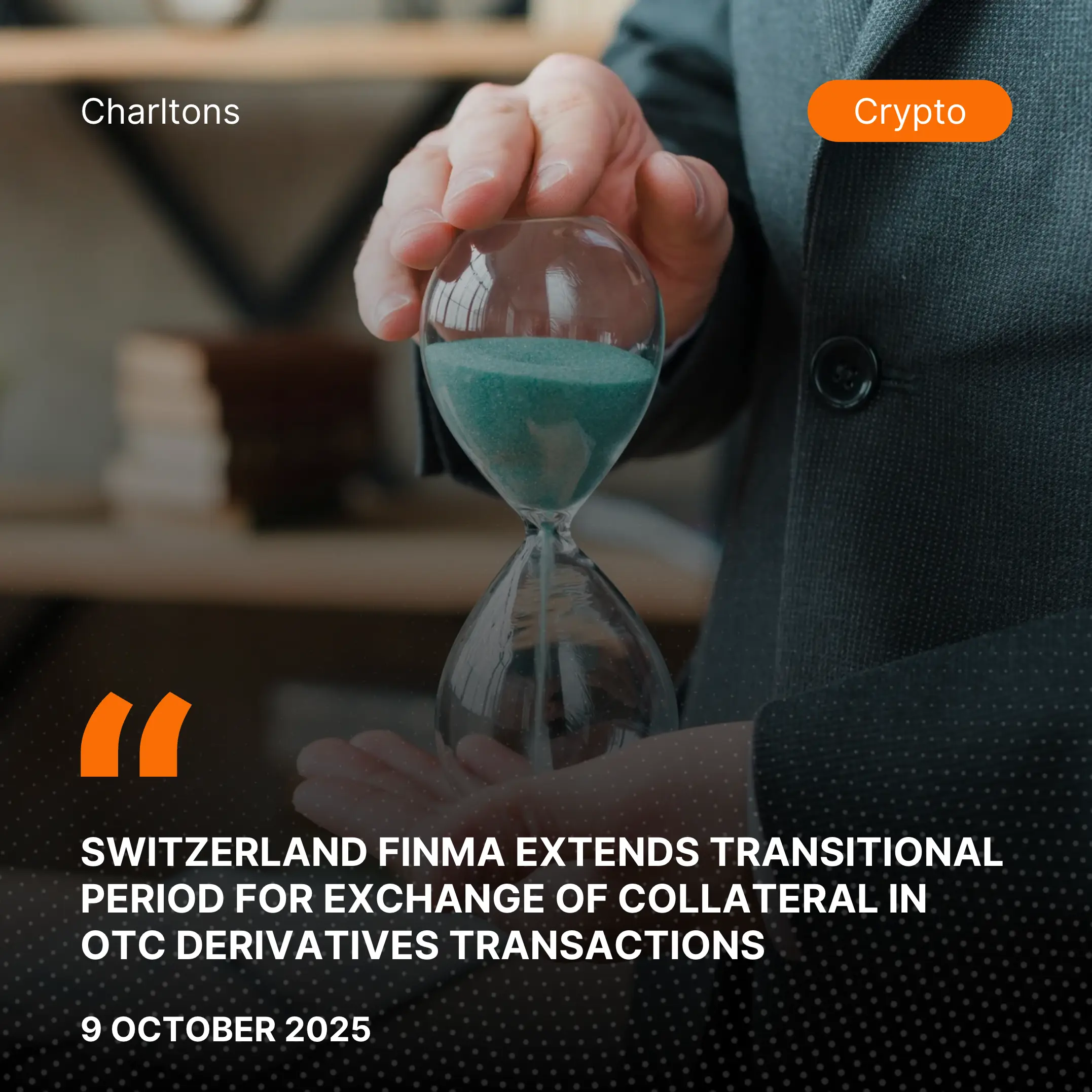The Securities and Futures Commission (SFC) issued a Circular on 11 December 2017 stating that it regards Bitcoin futures contracts traded on U.S. futures and commodities exchanges (Bitcoin Futures) as “futures contracts” for the purposes of the Securities and Futures Ordinance (the SFO). Companies carrying on a business of dealing in Bitcoin Futures, which would include those who relay or route Bitcoin Futures orders for Hong Kong investors, must therefore be licensed for Type 2 regulated activity (dealing in futures contracts), unless an exemption applies. Strict compliance with the suitability and conduct requirements of the Code of Conduct for Persons Licensed by or Registered with the SFC (the Code of Conduct) is also required.
The Circular was prompted by the launch of Bitcoin Futures trading on Chicago’s CBOE Futures Exchange on 11 December 2017, which was followed by the start of trading in Bitcoin Futures on the Chicago Mercantile Exchange on 18 December 2017. These exchanges are regulated by the U.S. Commodity Futures Trading Commission and are authorised by the SFC to provide automated trading services. Bitcoin Futures may be traded by Hong Kong investors through intermediaries that are members of these exchanges.
Hong Kong Legal and Regulatory Requirements
Although Bitcoin, the underlying assets of Bitcoin Futures, are not regulated under the SFO, Bitcoin Futures possess the conventional features of a “futures contract” as defined in the SFO. That definition includes “a contract or an option on a contract made under the rules or conventions of a futures market”.[1] Thus Bitcoin Futures which are traded on and subject to the rules of the CBOE Futures Exchange, the Chicago Mercantile Exchange and similar futures exchanges are “futures contracts” for the purposes of the SFO.
Companies dealing in Bitcoin Futures, including those which route or relay orders for Bitcoin Futures from Hong Kong investors to U.S. futures exchanges must be licensed for regulated activity Type 2 (dealing in futures), unless an exemption from the licensing requirement applies.
Applicable Code of Conduct Requirements
Intermediaries are expected to comply strictly with:
- the suitability requirement of paragraph 5.2 of the Code of Conduct; and
- the conduct requirements in relation to providing services in derivative products to clients under paragraphs 5.1A and 5.3 of the Code of Conduct.
Marketing Funds Investing in Bitcoin Futures
The SFC notes that marketing a fund that invests in Bitcoin Futures would normally be regarded as Type 1 regulated activity (dealing in securities), while managing such a fund may constitute Type 9 regulated activity (asset management). Provision of advisory services on Bitcoin Futures may constitute Type 5 regulated activity (advising on futures contracts).
Licensing Requirement Reminder
The Circular reminds intermediaries that a licence is required for parties providing any other business services relating to Bitcoin Futures that constitute a “regulated activity” as defined in Part 1 of Schedule 5 to the SFO. This applies irrespective of whether the party providing the services is located in Hong Kong or offshore: the licensing requirement applies so long as the business activities target the Hong Kong public.
Other Cryptocurrency-related Investment Products
The Circular also reminds parties dealing in, advising on, or managing other cryptocurrency-related investment products (e.g. cryptocurrency options, swaps and contracts for differences) that they may be subject to the SFC’s licensing, conduct and authorisation requirements under the SFO if these products constitute “securities” under the SFO. The conduct requirements which potentially apply to such products include, among others:
- the Know your Client: investor characterization requirements of paragraph of 5.1A of the Code of Conduct;
- the Know your Client: reasonable advice requirement under paragraph 5.2 of the Code of Conduct; and
- the Know your Client: derivative products requirement under paragraph 5.3 of the Code of Conduct.
Cryptocurrency Exchanges
The SFC Circular warns investors that some cryptocurrency exchanges offering cryptocurrency futures contracts and investment products in Hong Kong may be doing so in breach of Hong Kong’s laws and regulations.
Where cryptocurrency-related investment products constitute “futures contracts” or “securities” for the purposes of the SFO, the offering of such products to Hong Kong investors requires the relevant company and its employees to be licensed by the SFC. An unlicensed entity which offers these products in Hong Kong may be acting illegally.
Cryptocurrency exchanges offering these products in Hong Kong may be required to comply with the requirements for recognised exchange companies under Part III SFO or be licensed for regulated activity Type 10, providing automated trading services. On the other hand, cryptocurrency exchanges which operate entirely outside Hong Kong and do not target Hong Kong investors should not be subject to Hong Kong regulation.
Public Offer Requirements
Where an offer of any cryptocurrency-related investment product involves an invitation to the Hong Kong public to acquire “securities” or “structured products”, or to participate in a “collective investment scheme”, authorisation or registration requirements under the SFO or the Companies (Winding Up and Miscellaneous Provisions) Ordinance may apply in the absence of an applicable exemption.
Warning to Investors
The SFC also reminds investors of the risks involved in trading cryptocurrencies, including the risks of insufficient liquidity, price volatility, hacking and the potential for market manipulation. It also cautions investors that trading cryptocurrency futures may increase these risks due to the speculative nature of cryptocurrencies, the underlying assets, and the inherent leverage.
Trading cryptocurrency-related investment products on unregulated exchanges further exposes investors to potentially substantial risks and significant financial losses. The SFC thus reminds investors that they should ensure that they understand the features of cryptocurrency-related investment products and weigh them against their risk appetite.
[1] Pursuant to Section 1 of Part 1 of Schedule 1 to the SFO.
Bitcoin futures contracts
SFC’s licensing requirements under the SFO
marketing a Bitcoin Futures fund
cryptocurrency exchanges
Chicago’s CBOE Futures Exchange
trading cryptocurrencies risks
Chicago Mercantile Exchange
licence for parties providing business services relating to Bitcoin Futures
Code of Conduct for Persons Licensed by or Registered with the SFC
cryptocurrency options
cryptocurrency swaps
investing in cryptocurrency 2017
| Charltons | Boutique Transactional Law Firm of the Year 2017 Asian Legal Business Awards |
|
This newsletter is for information purposes only. Its contents do not constitute legal advice and it should not be regarded as a substitute for detailed advice in individual cases. Transmission of this information is not intended to create and receipt does not constitute a lawyer-client relationship between Charltons and the user or browser. Charltons is not responsible for any third party content which can be accessed through the website. If you do not wish to receive this newsletter please let us know by emailing us at unsubscribe@charltonslaw.com |
|
| Charltons Dominion Centre, 12th Floor 43-59 Queen’s Road East Hong Kong |
Tel: + (852) 2905 7888 Fax: + (852) 2854 9596 https://www.charltonsquantum.com |
| Charltons Quantum – 2018 | |





